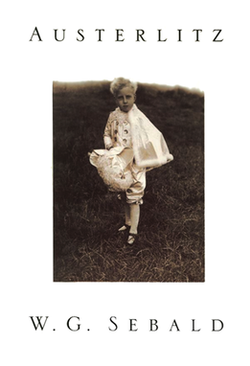Austerlitz (novel)
 |
|
| Author | W. G. Sebald |
|---|---|
| Translator | Anthea Bell |
| Cover artist | Andy Carpenter |
| Country | Germany |
| Language | German |
| Genre | Historical novel |
| Publisher | C. Hanser |
|
Publication date
|
6 November 2001 |
| Media type | Print (Hardback & Paperback) |
| Pages | 416 |
| ISBN | |
| OCLC | 46380518 |
Austerlitz is a 2001 novel by the German writer W. G. Sebald. It was Sebald's final novel. The book received the National Book Critics Circle Award.
Jacques Austerlitz, the main character in the book, is an architectural historian who encounters and befriends the solitary narrator in Antwerp during the 1960s. Gradually we come to understand his life history. He arrived in Britain during the summer of 1939 as an infant refugee on a kindertransport from a Czechoslovakia threatened by Hitler's Nazis. He was adopted by an elderly Welsh Nonconformist preacher and his sickly wife, and spent his childhood near Bala, Gwynedd, before attending a minor public school. His foster parents died, and Austerlitz learned something of his background. After school he attended Oriel College, Oxford and became an academic who is drawn to, and began his research in, the study of European architecture. After a nervous breakdown, Austerlitz visited Prague, where he met a close friend of his lost parents, Vera, who often took care of "Jacquot" when his parents were away. As he speaks with her, memories return, including French and Czech expressions she taught him. The elderly lady tells him the fate of his mother, an actress and opera singer who was deported to Theresienstadt concentration camp. From Prague, Austerlitz travels to Theriesenstadt, and after returning to England via train, with an emotionally difficult journey through Germany, manages to obtain a 14-minute video compilation of highlights from Theresienstadt. Ein Dokumentarfilm aus dem jüdischen Siedlungsgebiet, the 1944 Nazi propaganda film, in which he believes he recognizes his mother. Vera, however, dismisses the woman from the documentary. Instead, she confirms the identity of Austerlitz's mother in a photograph of an anonymous actress which Austerlitz found in the Prague theatrical archives.
...
Wikipedia
